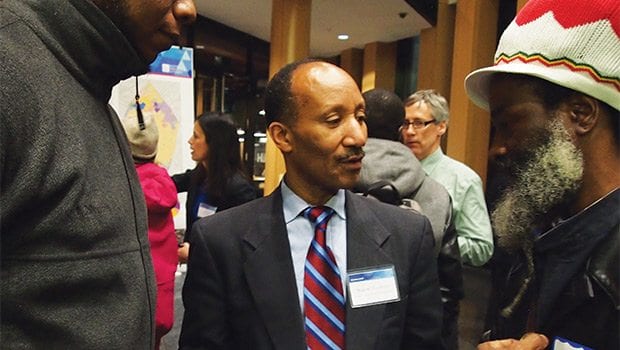
Roxbury residents mingled with city officials Monday evening during the kick-off event for Plan: Dudley Square, the Boston Redevelopment Authority’s community participation process for Roxbury’s commercial center.
Maps on poster board displays showed the planning area — which includes Dudley Square, Bartlett Yard, Harrison Avenue and Columbus Avenue between Melnea Cass Boulevard and Malcolm X Boulevard.
Through the planning process, the Boston Redevelopment Authority can change zoning and craft requests for proposals to develop the many vacant parcels of city-owned land in the area.
“What we want to examine is whether the zoning is right, and if not, we can take into account the needs of the community,” said Lara Merida, deputy director for Community Planning at the Boston Redevelopment Authority.
Monday’s meeting was the first of six scheduled before BRA officials hope to submit a finalized plan to the agency’s board in August.
The process, while more accelerated that those the BRA is undertaking in Jamaica Plain and South Boston, will touch on similar issues — the area’s business mix, transportation issues and housing — in a series of monthly meetings.
The end product will be the latest in a series of redevelopment plans for Dudley Square dating back to the 1970s administration of former Mayor Kevin White. An earlier plan, the 2007 Dudley Square Vision planning initiative, is still listed as “in process” on the BRA website.
But, as Dudley Square Main Streets Director Joyce Stanley noted, the area has undergone considerable progress in the last 20 years — including the redevelopment of 24 formerly vacant large buildings and the construction of five new buildings.
“Before, we were just trying to get the signature buildings done,” Stanley said. “Now it’s time to look at the gaps — what’s working in retail and what isn’t.”
“The goals and aspiration ten years ago were based upon cleaning up the abandoned buildings that were worth very little money,” said business owner Sharif Abdal-Khallaq. “Today we have a lot of value. We’ve advanced.”
City-owned parcels that remain vacant include the site of the former Area B substation on Dudley Street, Parcel 8 at the corner of the Harrison Avenue and Melnea Cass Boulevard and Parcel P 3 on Columbus Avenue.
Monday’s interactive meeting was held in the lobby of the Bruce Bolling Municipal Building. Display boards showing current land uses and zoning, transportation patterns and demographics lined one side of the lobby, while on the other were boards soliciting resident input on new land uses for the planning area and other questions like what new businesses should come to Dudley.
“We want people to ask questions and make recommendations,” said BRA Senior Planner Hughes Monestime, as residents left yellow notes on poster boards. Among the dozens of ideas posted to the boards were calls for more sit-down restaurants, restaurants that remain open after 7 p.m., and live entertainment.
Despite predictions that new development would drive up demand for parking, there was little interest in new parking facilities. Some local residents inquired about resident permit parking for the areas around the square, noted the Boston Transportation Department’s Alice Brown.
According to Transportation Department statistics, just 43 percent of the residents in the immediate Dudley Square planning area — which includes Madison Park, Ruggles and Williams streets — have access to a car, far fewer than the 64 percent citywide average.
The most common mode of transportation is buses — 36.7 percent — owing to proximity to Dudley Station, which is the MBTA’s busiest bus station. Just 6.4 percent of area residents rely on the subway. Only 3.6 percent bike to work, but 21.8 percent reported walking to work. Nearly a third of the residents — 31.4 percent — drive to work.
At the next meeting, scheduled for March 21, BRA officials will report back to Roxbury residents the community input they gathered from the Monday meeting. In April, the meeting will focus on Tools for Development. In May, the meeting will examine Design and Feasibility. The June meeting will concentrate on transportation and the public realm. At the July meeting, the BRA will present draft plans to which residents can provide their thoughts and reactions.
On August 1, the BRA officials expect to present the final implementation plan, before submitting it to the BRA board for an August 11 vote.







